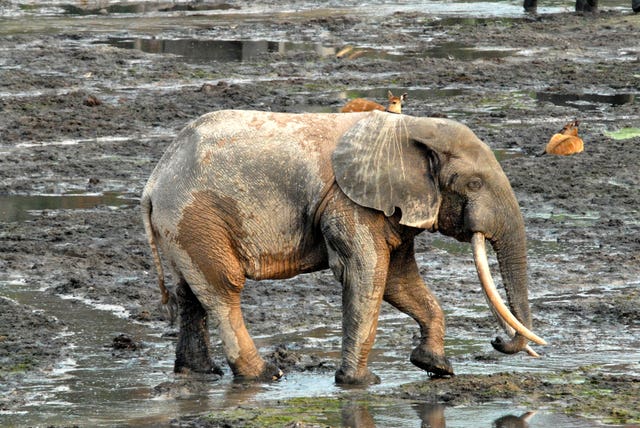
Hippos, walruses and whales could receive greater legal protection under Government proposals to extend the ivory ban.
Under the plans, the Ivory Act would be broadened to cover other ivory-bearing animals.
Currently, the law, which is yet to come into effect, covers the import, export and dealing in items containing elephant ivory.
The Department for Environment, Food and Rural Affairs (Defra), which is launching a consultation on the extension, said elephants are not the only animal sought for their ivory.
 Elephants were the first species to be protected by the Ivory Act 2018 (Andrea K. Turkalo/PA)
Elephants were the first species to be protected by the Ivory Act 2018 (Andrea K. Turkalo/PA)
Others, such as hippos, are also at risk from poachers, the department said, while killer whales and sperm whales are targeted for their teeth, and narwhals and walruses for their tusks.
The proposed plans could extend the Ivory Act to include these animals.
The consultation puts forward three options: retaining the current ban on elephant ivory in the UK only, extending the Act to hippo ivory only, and extending it the five listed species.
The species being considered for more protection face threats from issues including climate change, poaching, and hunting practices, Defra said.
 Lord Zac Goldsmith (Paul Ellis/PA Archive/PA Images)
Lord Zac Goldsmith (Paul Ellis/PA Archive/PA Images)
Killer and sperm whales are hunted for their teeth and narwhals and walruses for their tusks as well as the loss of biodiversity in the oceans amounting from climate change.
International Environment Minister Lord Goldsmith said: “The Ivory Act is one of the toughest bans of its kind in the world and sends a clear message that we are doing all that we can to save elephants from the threat of extinction.
“However the ivory trade is a conservation threat for other magnificent species such as the hippo, narwhal and walrus that are at threat.
“So I urge everyone to share their views to help ensure we can protect more animals from the grim ivory trade.”
The current Ivory Act, which gained Royal Assent in 2018, will introduce a near total ban on the import, export and dealing of items containing elephant ivory in the UK when it is brought into law.
 Killer whales could be protected by the Ivory Act (Audun Rikardsen/PA Media)
Killer whales could be protected by the Ivory Act (Audun Rikardsen/PA Media)
Dr Mark Jones, head of policy at the Born Free Foundation said: “Closing down elephant ivory markets is an essential step towards securing a future for elephants.
“However, by focusing only on the trade in elephant ivory, other ivory-bearing species could suffer as ivory traders and consumers turn to alternatives.
“By taking this step, the UK can send a clear signal to the rest of the world that killing animals to carve ornaments from their teeth is not acceptable in the 21st century.”
The consultation opens on Saturday July 17.
The Prime Minister has previously announced that funding to tackle the illegal wildlife trade will be increased as part of the £220 million International Biodiversity Fund.



Why are you making commenting on The Herald only available to subscribers?
It should have been a safe space for informed debate, somewhere for readers to discuss issues around the biggest stories of the day, but all too often the below the line comments on most websites have become bogged down by off-topic discussions and abuse.
heraldscotland.com is tackling this problem by allowing only subscribers to comment.
We are doing this to improve the experience for our loyal readers and we believe it will reduce the ability of trolls and troublemakers, who occasionally find their way onto our site, to abuse our journalists and readers. We also hope it will help the comments section fulfil its promise as a part of Scotland's conversation with itself.
We are lucky at The Herald. We are read by an informed, educated readership who can add their knowledge and insights to our stories.
That is invaluable.
We are making the subscriber-only change to support our valued readers, who tell us they don't want the site cluttered up with irrelevant comments, untruths and abuse.
In the past, the journalist’s job was to collect and distribute information to the audience. Technology means that readers can shape a discussion. We look forward to hearing from you on heraldscotland.com
Comments & Moderation
Readers’ comments: You are personally liable for the content of any comments you upload to this website, so please act responsibly. We do not pre-moderate or monitor readers’ comments appearing on our websites, but we do post-moderate in response to complaints we receive or otherwise when a potential problem comes to our attention. You can make a complaint by using the ‘report this post’ link . We may then apply our discretion under the user terms to amend or delete comments.
Post moderation is undertaken full-time 9am-6pm on weekdays, and on a part-time basis outwith those hours.
Read the rules here